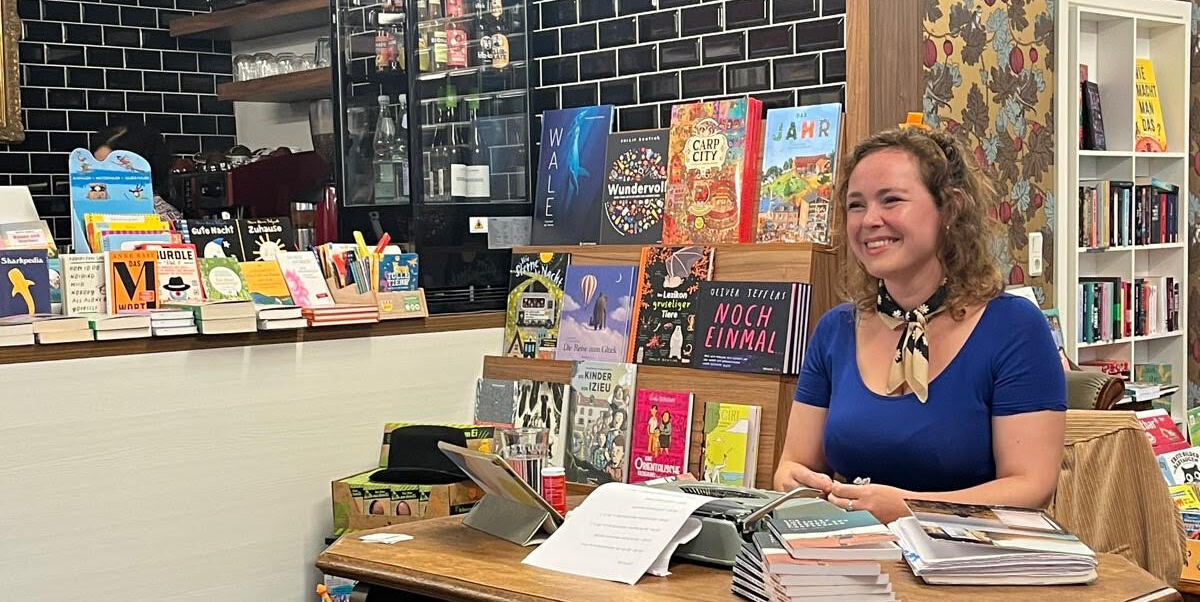I first met Martina Leber on June 21st, 2025, at the Vernissage of her “mind mazes” exhibition at Kunststück e.V. in Mainz. Both her visual art and poetry were on display, and the entire event felt like stepping inside the workings of a curious and creative mind. Her poems weren’t just printed and posted – they were placed. Some hung from a mobile that swayed gently above visitors’ heads, inviting us to stand inside and let her words drift around us. Others were strung together in a web-like installation, creating a kind of poetic choose-your-own-adventure. You could follow one thread, or hop around, letting instinct guide you.
This kind of playful, immersive approach to poetry is pure Martina. She experiments not just with words, but with how they’re experienced. It’s a signature she’s carried into other formats – like what she calls her “Poetry Slam-styled readings.” I’ve been sworn to secrecy on the details of her grand finales (and trust me, you want to be surprised), but I can tell you that the format is uniquely hers – somewhere between performance, conversation, and quiet spellcasting.
Since the Vernissage, Martina and I have found ourselves regularly meeting at cafes around Mainz, two creatives in quiet conversation about art and writing. I had picked up her book, the infinity between two heartbeats, an elegantly personal blend of monochromatic artwork and poetry in English, at Kunststück. When she mentioned she’d be doing one of her readings at Bukofski, I knew I had to be there.
Bukofski is a bookshop/café tucked away in a corner of the city, full of warm lighting and bohemian spirit. Owned by a married couple who clearly love books as much as they love each other, the place feels like a home. Window seats, mismatched chairs, a cozy sofa – it’s the kind of place you discover once and want to keep secret, just to preserve the magic.
Martina read from a small, antique round table that might’ve once held tea in someone’s grandmother’s parlor. The setup made it feel less like a formal reading and more like we were guests in a particularly cool, book-lined living room.
Her poetry explores dark, contemplative themes, but she kept the energy lively and the audience engaged. The reading was bilingual – half in German, half in English – and no one seemed to mind. On the contrary, it felt natural. Language became another texture in the room, another layer in the experience.
Halfway through, we took a break. Some people went out for air, others refilled their drinks. Only one person didn’t return, and I suspect he’d only shown up hoping for free booze. Everyone else came back more relaxed, more open. Something had shifted. As if the intermission gave us permission to exhale the weight of the day and return more ourselves: chatty, connected, ready.
The second half of the evening felt more intimate. Martina shared thoughts between poems, tangents that revealed the scaffolding behind the lines. We weren’t just listening; we were invited into her process.
It’s rare to feel that kind of warmth at a public reading, rarer still when the themes are heavy. But Martina’s work doesn’t just contemplate the dark, it renders it with such humanity that you find yourself leaning in, wanting more.
If you ever get the chance to attend one of her readings: go. And don’t ask about the ending. Let yourself be surprised.



